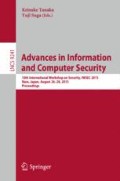Abstract
Revocable Hierarchical Identity-Based Encryption (RHIBE) is a variant of Identity-Based Encryption (IBE), which enables the dynamic user management; a Key Generation Center (KGC) of a usual IBE has a key issuing ability. In contrast, in a RHIBE, a KGC can revoke compromised secret keys and even delegate both key issuing ability and revocation ability.
Recently, Seo and Emura proposed the first construction for RHIBE (CT-RSA 2013) and then refined the security model and the construction for RHIBE (CT-RSA 2015). Nevertheless, their constructions achieve only a slightly weaker security notion, called selective-ID security, in the sense that the adversary has to choose and declare the target identity before she receives the system parameter of target RHIBE scheme.
In this paper, we propose the first RHIBE construction that achieves a right security notion, called adaptive-ID security. In particular, our construction still has the advantages of the Seo-Emura RHIBE schemes; that is, it is scalable and achieves history-free update, security against insiders, and short ciphertexts. We employ the dual system encryption methodology.
Access this chapter
Tax calculation will be finalised at checkout
Purchases are for personal use only
References
Boldyreva, A., Goyal, V., Kumar, V.: Identity-based encryption with efficient revocation. In: ACM CCS, pp. 417–426 (2008)
Boneh, D., Boyen, X., Goh, E.-J.: Hierarchical identity based encryption with constant size ciphertext. In: Cramer, R. (ed.) EUROCRYPT 2005. LNCS, vol. 3494, pp. 440–456. Springer, Heidelberg (2005)
Boneh, D., Franklin, M.: Identity-based encryption from the weil pairing. In: Kilian, J. (ed.) CRYPTO 2001. LNCS, vol. 2139, pp. 213–229. Springer, Heidelberg (2001)
Boneh, D., Franklin, M.K.: Identity-based encryption from the weil pairing. SIAM J. Comput. 32(3), 586–615 (2003)
Lewko, A.: Tools for simulating features of composite order bilinear groups in the prime order setting. In: Pointcheval, D., Johansson, T. (eds.) EUROCRYPT 2012. LNCS, vol. 7237, pp. 318–335. Springer, Heidelberg (2012)
Lewko, A., Waters, B.: New techniques for dual system encryption and fully secure HIBE with short ciphertexts. In: Micciancio, D. (ed.) TCC 2010. LNCS, vol. 5978, pp. 455–479. Springer, Heidelberg (2010)
Libert, B., Vergnaud, D.: Adaptive-ID secure revocable identity-based encryption. In: Fischlin, M. (ed.) CT-RSA 2009. LNCS, vol. 5473, pp. 1–15. Springer, Heidelberg (2009)
Naor, D., Naor, M., Lotspiech, J.: Revocation and tracing schemes for stateless receivers. In: Kilian, J. (ed.) CRYPTO 2001. LNCS, vol. 2139, pp. 41–62. Springer, Heidelberg (2001)
Seo, J.H., Emura, K.: Efficient delegation of key generation and revocation functionalities in identity-based encryption. In: Dawson, E. (ed.) CT-RSA 2013. LNCS, vol. 7779, pp. 343–358. Springer, Heidelberg (2013)
Seo, J.H., Emura, K.: Revocable identity-based encryption revisited: security model and construction. In: Kurosawa, K., Hanaoka, G. (eds.) PKC 2013. LNCS, vol. 7778, pp. 216–234. Springer, Heidelberg (2013)
Seo, J.H., Emura, K.: Revocable hierarchical identity-based encryption. Theor. Comput. Sci. 542, 44–62 (2014)
Seo, J.H., Emura, K.: Revocable identity-based cryptosystem revisited: Security models and constructions. IEEE Trans. Inf. Forensics Secur. 9(7), 1193–1205 (2014)
Seo, J.H., Emura, K.: Revocable hierarchical identity-based encryption: history-free update, security against insiders, and short ciphertexts. In: Nyberg, K. (ed.) CT-RSA 2015. LNCS, vol. 9048, pp. 106–123. Springer, Heidelberg (2015)
Tsai, T., Tseng, Y., Wu, T.: RHIBE: constructing revocable hierarchical ID-based encryption from HIBE. Informatica Lith. Acad. Sci. 25(2), 299–326 (2014)
Waters, B.: Dual system encryption: realizing fully secure IBE and HIBE under simple assumptions. In: Halevi, S. (ed.) CRYPTO 2009. LNCS, vol. 5677, pp. 619–636. Springer, Heidelberg (2009)
Author information
Authors and Affiliations
Corresponding author
Editor information
Editors and Affiliations
Rights and permissions
Copyright information
© 2015 Springer International Publishing Switzerland
About this paper
Cite this paper
Seo, J.H., Emura, K. (2015). Adaptive-ID Secure Revocable Hierarchical Identity-Based Encryption. In: Tanaka, K., Suga, Y. (eds) Advances in Information and Computer Security. IWSEC 2015. Lecture Notes in Computer Science(), vol 9241. Springer, Cham. https://doi.org/10.1007/978-3-319-22425-1_2
Download citation
DOI: https://doi.org/10.1007/978-3-319-22425-1_2
Published:
Publisher Name: Springer, Cham
Print ISBN: 978-3-319-22424-4
Online ISBN: 978-3-319-22425-1
eBook Packages: Computer ScienceComputer Science (R0)

